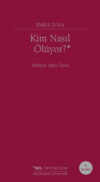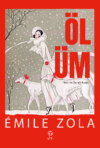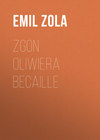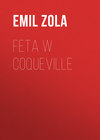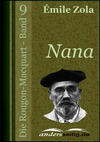Kitabı oku: «His Masterpiece», sayfa 17
But Christine, frightened at seeing Claude so absorbed, and seized herself with a kind of religious awe, took hold of his arm and dragged him away, as if she had felt that some great danger was threatening him.
‘Let us go home. You are doing yourself harm. I want to get back.’
At her touch he started like a man disturbed in sleep. Then, turning his head to take a last look, he muttered: ‘Ah! heavens! Ah! heavens, how beautiful!’
He allowed himself to be led away. But throughout the evening, first at dinner, afterwards beside the stove, and until he went to bed, he remained like one dazed, so deep in his cogitations that he did not utter half a dozen sentences. And Christine, failing to draw from him any answer to her questions, at last became silent also. She looked at him anxiously; was it the approach of some serious illness, had he inhaled some bad air whilst standing midway across the bridge yonder? His eyes stared vaguely into space, his face flushed as if with some inner straining. One would have thought it the mute travail of germination, as if something were springing into life within him.
The next morning, immediately after breakfast, he set off, and Christine spent a very sorrowful day, for although she had become more easy in mind on hearing him whistle some of his old southern tunes as he got up, she was worried by another matter, which she had not mentioned to him for fear of damping his spirits again. That day they would for the first time lack everything; a whole week separated them from the date when their little income would fall due, and she had spent her last copper that morning. She had nothing left for the evening, not even the wherewithal to buy a loaf. To whom could she apply? How could she manage to hide the truth any longer from him when he came home hungry? She made up her mind to pledge the black silk dress which Madame Vanzade had formerly given her, but it was with a heavy heart; she trembled with fear and shame at the idea of the pawnshop, that familiar resort of the poor which she had never as yet entered. And she was tortured by such apprehension about the future, that from the ten francs which were lent her she only took enough to make a sorrel soup and a stew of potatoes. On coming out of the pawn-office, a meeting with somebody she knew had given her the finishing stroke.
As it happened, Claude came home very late, gesticulating merrily, and his eyes very bright, as if he were excited by some secret joy; he was very hungry, and grumbled because the cloth was not laid. Then, having sat down between Christine and little Jacques, he swallowed his soup and devoured a plateful of potatoes.
‘Is that all?’ he asked, when he had finished. ‘You might as well have added a scrap of meat. Did you have to buy some boots again?’
She stammered, not daring to tell him the truth, but hurt at heart by this injustice. He, however, went on chaffing her about the coppers she juggled away to buy herself things with; and getting more and more excited, amid the egotism of feelings which he seemingly wished to keep to himself, he suddenly flew out at Jacques.
‘Hold your noise, you brat! – you drive one mad.’
The child, forgetting all about his dinner, had been tapping the edge of his plate with his spoon, his eyes full of mirthful delight at this music.
‘Jacques, be quiet,’ scoldingly said his mother, in her turn. ‘Let your father have his dinner in peace.’
Then the little one, abashed, at once became very quiet, and relapsed into gloomy stillness, with his lustreless eyes fixed on his potatoes, which, however, he did not eat.
Claude made a show of stuffing himself with cheese, while Christine, quite grieved, offered to fetch some cold meat from a ham and beef shop; but he declined, and prevented her going by words that pained her still more. Then, the table having been cleared, they all sat round the lamp for the evening, she sewing, the little one turning over a picture-book in silence, and Claude drumming on the table with his fingers, his mind the while wandering back to the spot whence he had come. Suddenly he rose, sat down again with a sheet of paper and a pencil, and began sketching rapidly, in the vivid circle of light that fell from under the lamp-shade. And such was his longing to give outward expression to the tumultuous ideas beating in his skull, that soon this sketch did not suffice for his relief. On the contrary, it goaded him on, and he finished by unburthening his mind in a flood of words. He would have shouted to the walls; and if he addressed himself to his wife it was because she happened to be there.
‘Look, that’s what we saw yesterday. It’s magnificent. I spent three hours there to-day. I’ve got hold of what I want – something wonderful, something that’ll knock everything else to pieces. Just look! I station myself under the bridge; in the immediate foreground I have the Port of St. Nicolas, with its crane, its lighters which are being unloaded, and its crowd of labourers. Do you see the idea – it’s Paris at work – all those brawny fellows displaying their bare arms and chests? Then on the other side I have the swimming-baths – Paris at play – and some skiff there, no doubt, to occupy the centre of the composition; but of that I am not as yet certain. I must feel my way. As a matter of course, the Seine will be in the middle, broad, immense.’
While talking, he kept on indicating outlines with his pencil, thickening his strokes over and over again, and tearing the paper in his very energy. She, in order to please him, bent over the sketch, pretending to grow very interested in his explanations. But there was such a labyrinth of lines, such a confusion of summary details, that she failed to distinguish anything.
‘You are following me, aren’t you?’
‘Yes, yes, very beautiful indeed.’
‘Then I have the background, the two arms of the rivet with their quays, the Cite, rising up triumphantly in the centre, and standing out against the sky. Ah! that background, what a marvel! People see it every day, pass before it without stopping; but it takes hold of one all the same; one’s admiration accumulates, and one fine afternoon it bursts forth. Nothing in the world can be grander; it is Paris herself, glorious in the sunlight. Ah! what a fool I was not to think of it before! How many times I have looked at it without seeing! However, I stumbled on it after that ramble along the quays! And, do you remember, there’s a dash of shadow on that side; while here the sunrays fall quite straight. The towers are yonder; the spire of the Sainte-Chapelle tapers upward, as slim as a needle pointing to the sky. But no, it’s more to the right. Wait, I’ll show you.’
He began again, never wearying, but constantly retouching the sketch, and adding innumerable little characteristic details which his painter’s eye had noticed; here the red signboard of a distant shop vibrated in the light; closer by was a greenish bit of the Seine, on whose surface large patches of oil seemed to be floating; and then there was the delicate tone of a tree, the gamut of greys supplied by the house frontages, and the luminous cast of the sky. She complaisantly approved of all he said and tried to look delighted.
But Jacques once again forgot what he had been told. After long remaining silent before his book, absorbed in the contemplation of a wood-cut depicting a black cat, he began to hum some words of his own composition: ‘Oh, you pretty cat; oh, you ugly cat; oh, you pretty, ugly cat,’ and so on, ad infinitum, ever in the same lugubrious manner.
Claude, who was made fidgety by the buzzing noise, did not at first understand what was upsetting him. But after a time the child’s harassing phrase fell clearly upon his ear.
‘Haven’t you done worrying us with your cat?’ he shouted furiously.
‘Hold your tongue, Jacques, when your father is talking!’ repeated Christine.
Upon my word, I do believe he is becoming an idiot. Just look at his head, if it isn’t like an idiot’s. It’s dreadful. Just say; what do you mean by your pretty and ugly cat?’
The little fellow, turning pale and wagging his big head, looked stupid, and replied: ‘Don’t know.’
Then, as his father and mother gazed at each other with a discouraged air, he rested his cheek on the open picture-book, and remained like that, neither stirring nor speaking, but with his eyes wide open.
It was getting late; Christine wanted to put him to bed, but Claude had already resumed his explanations. He now told her that, the very next morning, he should go and make a sketch on the spot, just in order to fix his ideas. And, as he rattled on, he began to talk of buying a small camp easel, a thing upon which he had set his heart for months. He kept harping on the subject, and spoke of money matters till she at last became embarrassed, and ended by telling him of everything – the last copper she had spent that morning, and the silk dress she had pledged in order to dine that evening. Thereupon he became very remorseful and affectionate; he kissed her and asked her forgiveness for having complained about the dinner. She would excuse him, surely; he would have killed father and mother, as he kept on repeating, when that confounded painting got hold of him. As for the pawn-shop, it made him laugh; he defied misery.
‘I tell you that we are all right,’ he exclaimed. ‘That picture means success.’
She kept silent, thinking about her meeting of the morning, which she wished to hide from him; but without apparent cause or transition, in the kind of torpor that had come over her, the words she would have kept back rose invincibly to her lips.
‘Madame Vanzade is dead,’ she said.
He looked surprised. Ah! really? How did she, Christine, know it?
‘I met the old man-servant. Oh, he’s a gentleman by now, looking very sprightly, in spite of his seventy years. I did not know him again. It was he who spoke to me. Yes, she died six weeks ago. Her millions have gone to various charities, with the exception of an annuity to the old servants, upon which they are living snugly like people of the middle-classes.’
He looked at her, and at last murmured, in a saddened voice: ‘My poor Christine, you are regretting things now, aren’t you? She would have given you a marriage portion, have found you a husband! I told you so in days gone by. She would, perhaps, have left you all her money, and you wouldn’t now be starving with a crazy fellow like myself.’
She then seemed to wake from her dream. She drew her chair to his, caught hold of one of his arms and nestled against him, as if her whole being protested against his words:
‘What are you saying? Oh! no; oh! no. It would have been shameful to have thought of her money. I would confess it to you if it were the case, and you know that I never tell lies; but I myself don’t know what came over me when I heard the news. I felt upset and saddened, so sad that I imagined everything was over for me. It was no doubt remorse; yes, remorse at having deserted her so brutally, poor invalid that she was, the good old soul who called me her daughter! I behaved very badly, and it won’t bring me luck. Ah! don’t say “No,” I feel it well enough; henceforth there’s an end to everything for me.’
Then she wept, choked by those confused regrets, the significance of which she failed to understand, regrets mingling with the one feeling that her life was spoilt, and that she now had nothing but unhappiness before her.
‘Come, wipe your eyes,’ said Claude, becoming affectionate once more. ‘Is it possible that you, who were never nervous, can conjure up chimeras and worry yourself in this way? Dash it all, we shall get out of our difficulties! First of all, you know that it was through you that I found the subject for my picture. There cannot be much of a curse upon you, since you bring me luck.’
He laughed, and she shook her head, seeing well enough that he wanted to make her smile. She was suffering on account of his picture already; for on the bridge he had completely forgotten her, as if she had ceased to belong to him! And, since the previous night, she had realised that he was farther and farther removed from her, alone in a world to which she could not ascend. But she allowed him to soothe her, and they exchanged one of their kisses of yore, before rising from the table to retire to rest.
Little Jacques had heard nothing. Benumbed by his stillness, he had fallen asleep, with his cheek on his picture-book; and his big head, so heavy at times that it bent his neck, looked pale in the lamplight. Poor little offspring of genius, which, when it begets at all, so often begets idiocy or physical imperfection! When his mother put him to bed Jacques did not even open his eyes.
It was only at this period that the idea of marrying Christine came to Claude. Though yielding to the advice of Sandoz, who expressed his surprise at the prolongation of an irregular situation which no circumstances justified, he more particularly gave way to a feeling of pity, to a desire to show himself kind to his mistress, and to win forgiveness for his delinquencies. He had seen her so sad of late, so uneasy with respect to the future, that he did not know how to revive her spirits. He himself was growing soured, and relapsing into his former fits of anger, treating her, at times, like a servant, to whom one flings a week’s notice. Being his lawful wife, she would, no doubt, feel herself more in her rightful home, and would suffer less from his rough behaviour. She herself, for that matter, had never again spoken of marriage. She seemed to care nothing for earthly things, but entirely reposed upon him; however, he understood well enough that it grieved her that she was not able to visit at Sandoz’s. Besides, they no longer lived amid the freedom and solitude of the country; they were in Paris, with its thousand and one petty spites, everything that is calculated to wound a woman in an irregular position. In reality, he had nothing against marriage save his old prejudices, those of an artist who takes life as he lists. Since he was never to leave her, why not afford her that pleasure? And, in fact, when he spoke to her about it, she gave a loud cry and threw her arms round his neck, surprised at experiencing such great emotion. During a whole week it made her feel thoroughly happy. But her joy subsided long before the ceremony.
Moreover, Claude did not hurry over any of the formalities, and they had to wait a long while for the necessary papers. He continued getting the sketches for his picture together, and she, like himself, did not seem in the least impatient. What was the good? It would assuredly make no difference in their life. They had decided to be married merely at the municipal offices, not in view of displaying any contempt for religion, but to get the affair over quickly and simply. That would suffice. The question of witnesses embarrassed them for a moment. As she was absolutely unacquainted with anybody, he selected Sandoz and Mahoudeau to act for her. For a moment he had thought of replacing the latter by Dubuche, but he never saw the architect now, and he feared to compromise him. He, Claude, would be content with Jory and Gagniere. In that way the affair would pass off among friends, and nobody would talk of it.
Several weeks had gone by; they were in December, and the weather proved terribly cold. On the day before the wedding, although they barely had thirty-five francs left them, they agreed that they could not send their witnesses away with a mere shake of the hand; and, rather than have a lot of trouble in the studio, they decided to offer them lunch at a small restaurant on the Boulevard de Clichy, after which they would all go home.
In the morning, while Christine was tacking a collar to a grey linsey gown which, with the coquetry of woman, she had made for the occasion, it occurred to Claude, who was already wearing his frock-coat and kicking his heels impatiently, to go and fetch Mahoudeau, for the latter, he asserted, was quite capable of forgetting all about the appointment. Since autumn, the sculptor had been living at Montmartre, in a small studio in the Rue des Tilleuls. He had moved thither in consequence of a series of affairs that had quite upset him. First of all, he had been turned out of the fruiterer’s shop in the Rue du Cherche-Midi for not paying his rent; then had come a definite rupture with Chaine, who, despairing of being able to live by his brush, had rushed into commercial enterprise, betaking himself to all the fairs around Paris as the manager of a kind of ‘fortune’s wheel’ belonging to a widow; while last of all had come the sudden flight of Mathilde, her herbalist’s business sold up, and she herself disappearing, it seemed, with some mysterious admirer. At present Mahoudeau lived all by himself in greater misery than ever, only eating when he secured a job at scraping some architectural ornaments, or preparing work for some more prosperous fellow-sculptor.
‘I am going to fetch him, do you hear?’ Claude repeated to Christine. ‘We still have a couple of hours before us. And, if the others come, make them wait. We’ll go to the municipal offices all together.’
Once outside, Claude hurried along in the nipping cold which loaded his moustache with icicles. Mahoudeau’s studio was at the end of a conglomeration of tenements – ‘rents,’ so to say – and he had to cross a number of small gardens, white with rime, and showing the bleak, stiff melancholy of cemeteries. He could distinguish his friend’s place from afar on account of the colossal plaster statue of the ‘Vintaging Girl,’ the once successful exhibit of the Salon, for which there had not been sufficient space in the narrow ground-floor studio. Thus it was rotting out in the open like so much rubbish shot from a cart, a lamentable spectacle, weather-bitten, riddled by the rain’s big, grimy tears. The key was in the door, so Claude went in.
‘Hallo! have you come to fetch me?’ said Mahoudeau, in surprise. ‘I’ve only got my hat to put on. But wait a bit, I was asking myself whether it wouldn’t be better to light a little fire. I am uneasy about my woman there.’
Some water in a bucket was ice-bound. So cold was the studio that it froze inside as hard as it did out of doors, for, having been penniless for a whole week, Mahoudeau had gingerly eked out the little coal remaining to him, only lighting the stove for an hour or two of a morning. His studio was a kind of tragic cavern, compared with which the shop of former days evoked reminiscences of snug comfort, such was the tomb-like chill that fell on one’s shoulders from the creviced ceiling and the bare walls. In the various corners some statues, of less bulky dimensions than the ‘Vintaging Girl,’ plaster figures which had been modelled with passion and exhibited, and which had then come back for want of buyers, seemed to be shivering with their noses turned to the wall, forming a melancholy row of cripples, some already badly damaged, showing mere stumps of arms, and all dust-begrimed and clay-bespattered. Under the eyes of their artist creator, who had given them his heart’s blood, those wretched nudities dragged out years of agony. At first, no doubt, they were preserved with jealous care, despite the lack of room, but then they lapsed into the grotesque honor of all lifeless things, until a day came when, taking up a mallet, he himself finished them off, breaking them into mere lumps of plaster, so as to be rid of them.
‘You say we have got two hours, eh?’ resumed Mahoudeau. ‘Well, I’ll just light a bit of fire; it will be the wiser perhaps.’
Then, while lighting the stove, he began bewailing his fate in an angry voice. What a dog’s life a sculptor’s was! The most bungling stonemason was better off. A figure which the Government bought for three thousand francs cost well nigh two thousand, what with its model, clay, marble or bronze, all sorts of expenses, indeed, and for all that it remained buried in some official cellar on the pretext that there was no room for it elsewhere. The niches of the public buildings remained empty, pedestals were awaiting statues in the public gardens. No matter, there was never any room! And there were no possible commissions from private people; at best one received an order for a few busts, and at very rare intervals one for a memorial statue, subscribed for by the public and hurriedly executed at reduced terms. Sculpture was the noblest of arts, the most manly, yes, but the one which led the most surely to death by starvation!
‘Is your machine progressing?’ asked Claude.
‘Without this confounded cold, it would be finished,’ answered Mahoudeau. ‘I’ll show it you.’
He rose from his knees after listening to the snorting of the stove. In the middle of the studio, on a packing-case, strengthened by cross-pieces, stood a statue swathed is linen wraps which were quite rigid, hard frozen, draping the figure with the whiteness of a shroud. This statue embodied Mahoudeau’s old dream, unrealised until now from lack of means – it was an upright figure of that bathing girl of whom more than a dozen small models had been knocking about his place for years. In a moment of impatient revolt he himself had manufactured trusses and stays out of broom-handles, dispensing with the necessary iron work in the hope that the wood would prove sufficiently solid. From time to time he shook the figure to try it, but as yet it had not budged.
‘The devil!’ he muttered; ‘some warmth will do her good. These wraps seem glued to her – they form quite a breastplate.’
The linen was crackling between his fingers, and splinters of ice were breaking off. He was obliged to wait until the heat produced a slight thaw, and then with great care he stripped the figure, baring the head first, then the bosom, and then the hips, well pleased at finding everything intact, and smiling like a lover at a woman fondly adored.
‘Well, what do you think of it?’
Claude, who had only previously seen a little rough model of the statue, nodded his head, in order that he might not have to answer immediately. Decidedly, that good fellow Mahoudeau was turning traitor, and drifting towards gracefulness, in spite of himself, for pretty things ever sprang from under his big fingers, former stonecutter though he was. Since his colossal ‘Vintaging Girl,’ he had gone on reducing and reducing the proportions of his figures without appearing to be aware of it himself, always ready to stick out ferociously for the gigantic, which agreed with his temperament, but yielding to the partiality of his eyes for sweetness and gracefulness. And indeed real nature broke at last through inflated ambition. Exaggerated still, his ‘Bathing Girl’ was already possessed of great charm, with her quivering shoulders and her tightly-crossed arms that supported her breast.
‘Well, you don’t like her?’ he asked, looking annoyed.
‘Oh, yes, I do! I think you are right to tone things down a bit, seeing that you feel like that. You’ll have a great success with this. Yes, it’s evident it will please people very much.’
Mahoudeau, whom such praises would once have thrown into consternation, seemed delighted. He explained that he wished to conquer public opinion without relinquishing a tithe of his convictions.
‘Ah! dash it! it takes a weight off my mind to find you pleased,’ said he, ‘for I should have destroyed it if you had told me to do so, I give you my word! Another fortnight’s work, and I’ll sell my skin to no matter whom in order to pay the moulder. I say, I shall have a fine show at the Salon, perhaps get a medal.’
He laughed, waved his arms about, and then, breaking off:
‘As we are not in a hurry, sit down a bit. I want to get the wraps quite thawed.’
The stove, which was becoming red hot, diffused great heat. The figure, placed close by, seemed to revive under the warm air that now crept up her from her shins to her neck. And the two friends, who had sat down, continued looking the statue full in the face, chatting about it and noting each detail. The sculptor especially grew excited in his delight, and indulged in caressing gestures.
All at once, however, Claude fancied he was the victim of some hallucination. To him the figure seemed to be moving; a quiver like the ripple of a wavelet crossed her stomach, and her left hip became straightened, as if the right leg were about to step out.
‘Have you noticed the smooth surface just about the loins?’ Mahoudeau went on, without noticing anything. ‘Ah, my boy, I took great pains over that!’
But by degrees the whole statue was becoming animated. The loins swayed and the bosom swelled, as with a deep sigh, between the parted arms. And suddenly the head drooped, the thighs bent, and the figure came forward like a living being, with all the wild anguish, the grief-inspired spring of a woman who is flinging herself down.
Claude at last understood things, when Mahoudeau uttered a terrible cry. ‘By heavens, she’s breaking to pieces! – she is coming down!’
The clay, in thawing, had snapped the weak wooden trusses. There came a cracking noise, as if bones indeed were splitting; and Mahoudeau, with the same passionate gesture with which he had caressed the figure from afar, working himself into a fever, opened both arms, at the risk of being killed by the fall. For a moment the bathing girl swayed to and fro, and then with one crash came down on her face, broken in twain at the ankles, and leaving her feet sticking to the boards.
Claude had jumped up to hold his friend back.
‘Dash it! you’ll be smashed!’ he cried.
But dreading to see her finish herself off on the floor, Mahoudeau remained with hands outstretched. And the girl seemed to fling herself on his neck. He caught her in his arms, winding them tightly around her. Her bosom was flattened against his shoulder and her thighs beat against his own, while her decapitated head rolled upon the floor. The shock was so violent that Mahoudeau was carried off his legs and thrown over, as far back as the wall; and there, without relaxing his hold on the girl’s trunk, he remained as if stunned lying beside her.
‘Ah! confound it!’ repeated Claude, furiously, believing that his friend was dead.
With great difficulty Mahoudeau rose to his knees, and burst into violent sobs. He had only damaged his face in the fall. Some blood dribbled down one of his cheeks, mingling with his tears.
‘Ah! curse poverty!’ he said. ‘It’s enough to make a fellow drown himself not to be able to buy a couple of rods! And there she is, there she is!’
His sobs grew louder; they became an agonising wail; the painful shrieking of a lover before the mutilated corpse of his affections. With unsteady hands he touched the limbs lying in confusion around him; the head, the torso, the arms that had snapped in twain; above aught else the bosom, now caved in. That bosom, flattened, as if it had been operated upon for some terrible disease, suffocated him, and he unceasingly returned to it, probing the sore, trying to find the gash by which life had fled, while his tears, mingled with blood, flowed freely, and stained the statue’s gaping wounds with red.
‘Do help me!’ he gasped. ‘One can’t leave her like this.’
Claude was overcome also, and his own eyes grew moist from a feeling of artistic brotherliness. He hastened to his comrade’s aide, but the sculptor, after claiming his assistance, persisted in picking up the remains by himself, as if dreading the rough handling of anybody else. He slowly crawled about on his knees, took up the fragments one by one, and put them together on a board. The figure soon lay there in its entirety, as if it had been one of those girls who, committing suicide from love, throw themselves from some monument and are shattered by their fall, and put together again, looking both grotesque and lamentable, to be carried to the Morgue. Mahoudeau, seated on the floor before his statue, did not take his eyes from it, but became absorbed in heart-rending contemplation. However, his sobs subsided, and at last he said with a long-drawn sigh: ‘I shall have to model her lying down! There’s no other way! Ah, my poor old woman, I had such trouble to set her on her legs, and I thought her so grand like that!’
But all at once Claude grew uneasy. What about his wedding? Mahoudeau must change his clothes. As he had no other frock-coat than the one he was wearing, he was obliged to make a jacket do. Then, the figure having been covered with linen wraps once more, like a corpse over which a sheet has been pulled, they both started off at a run. The stove was roaring away, the thaw filled the whole studio with water, and slush streamed from the old dust-begrimed plaster casts.
When they reached the Rue de Douai there was no one there except little Jacques, in charge of the doorkeeper. Christine, tired of waiting, had just started off with the three others, thinking that there had been some mistake – that Claude might have told her that he would go straight to the mayor’s offices with Mahoudeau. The pair fell into a sharp trot, but only overtook Christine and their comrades in the Rue Drouot in front of the municipal edifice. They all went upstairs together, and as they were late they met with a very cool reception from the usher on duty. The wedding was got over in a few minutes, in a perfectly empty room. The mayor mumbled on, and the bride and bridegroom curtly uttered the binding ‘Yes,’ while their witnesses were marvelling at the bad taste of the appointments of the apartment. Once outside, Claude took Christine’s arm again, and that was all.
It was pleasant walking in the clear frosty weather. Thus the party quietly went back on foot, climbing the Rue des Martyrs to reach the restaurant on the Boulevard de Clichy. A small private room had been engaged; the lunch was a very friendly affair, and not a word was said about the simple formality that had just been gone through; other subjects were spoken of all the while, as at one of their customary gatherings.

